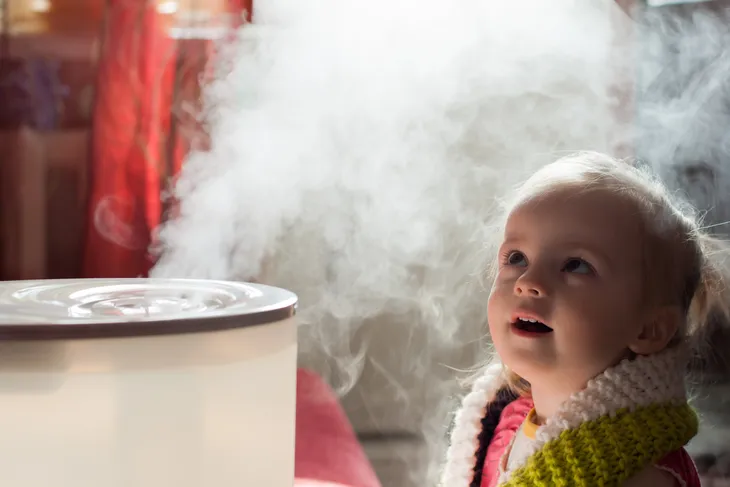- Croup is a viral infection that causes swelling around the vocal cords.
- The virus is spread through coughing and sneezing and is highly contagious.
- Most common symptoms are a barking cough, but can also cause a runny nose, sneezing, and even a fever.
You hear the dreaded barking cough from your child. Naturally, as a parent, you get concerned and might even panic that something is terribly wrong. But while there can be severe cases of croup (which we’ll explain in more detail), many times a trip to the doctor won’t be warranted.
The viral infection commonly strikes kids under five years of age, adding to the urgency of the situation. However, knowing the signs and how to react to croup, can successfully steer your child through it without undue stress. Here are 12 things to keep in mind if you suspect your child has a croup infection…
Croup is Commonly From a Viral Infection
Croup – medically known as laryngotracheobronchitis – is characterized by what sounds like a “barking seal.” It is the result of a viral infection that causes swelling around the vocal cords, according to Healthline. In fact, the same viruses that cause the common cold (parainfluenza) can also lead to croup, adds the source.
The source adds that several other viruses could be the catalyst behind this condition, including adenovirus that can also cause a cold. Respiratory Syncytial Virus (RSV) is another common cause of croup among kids, but it can also be the result of allergies and bacterial infections, it notes.
Often Worse in Younger Kids
Adding to the potential panic of croup is that the symptoms can be especially pronounced in kids under 3, as the respiratory system is considerably smaller than an adults’, notes Healthline. The narrowing of the airways gives croup its signature sound. The 6-month to 3-year range is also the highest risk age category for the infection.
With that said, the symptoms of croup infection are often more than just the telltale barking cough, adds the source. Because the same viruses are often responsible for croup and colds, your child may also have a runny nose and sneezing, it notes. They may also experience a fever and labored breathing.
Can Be More Pronounced at Night
If your child has croup, you may be awakened abruptly during your slumber due to a “croup attack.” For this reason, it may be wise to set up a temporary sleeping pad in your child’s room for the duration of the illness for convenience and to monitor their breathing.
While the condition can improve again during the day, it might get worse again when the night rolls around, according to HealthlinkBC. It’s not known exactly why, but some experts attribute this to a drop of natural swelling-reducing steroids in your child’s body during sleep, as well as the air being drier due to heaters.
May Not Require a Doctor Visit
While the telltale barking sound and slight fever are usually signs that croup is at play, if you want to be sure you should book an appointment with your child’s pediatrician. Medical professionals can sometimes tell it’s croup just by listening over the phone, says Healthline.
In some cases, especially if the cough lingers, a visit may be wise to rule out any other possible conditions. Your doctor may order an x-ray or a throat exam to ensure there’s nothing else causing the coughing and heavier breathing, adds the source.
It’s Highly Contagious
It’s a good idea to keep your child away from other children for a few days when they show signs of croup, because the virus is spread through droplets from coughing or sneezing, notes Healthline. It might also come from contacting a hard surface such as a doorknob, rather than directly breathing it in, adds the source.
The source adds that teens can develop croup as well, and it can also be spread to adults. However, because of a larger and more developed respiratory system, the symptoms of croup in an adult won’t be as alarming, says Healthline. Instead of a barking cough, it’s more likely to be a light cough or a sore throat, it notes.
Things You Can do at Home
There are a few ways that croup can be treated without needing to visit the doctor, explains the University of Utah Health. For example, one approach is to create steam in the bathroom by running a hot shower, and letting your child breathe in the steam to ease and relax the vocal cords.
You might also want to put a cool mist humidifier (not a warm vaporizer) in your child’s room to help avoid nighttime croup attacks – or at least make them more severe in the short-term, adds the source. Cold air is good to settle down the cough – so that means bringing your child outdoors for a bit if it’s wintry out, or even letting them breathe some cold air from the freezer. Meanwhile, warmer liquids are best to drink to help dislodge mucus in the vocal cords, it adds.
Medical Treatments are Available
While most cases can clear up on their own by using the home remedies, you’ll want to visit the ER if your child’s breathing seems especially labored, notes Healthline. A doctor might opt to use steroids to help open up airways and ease their breathing woes, adds the source.
A single dose of corticosteroid medication may be given, and doctors may prescribe a steroid medication to be used at home for a longer duration. In more extreme cases, a doctor or hospital might use a breathing tube to ensure your child is getting enough oxygen, it adds. In some cases where a bacterial infection is determined as the cause of croup, antibiotics can be helpful, notes Healthline.
May be Triggered by Allergies
While most cases of croup are caused by a viral infection, a version called spasmodic croup isn’t and is often triggered by an allergic reaction, according to Harvard Medical School. Spasmodic croup can appear out of nowhere (they can appear healthy one minute and be coughing the next), although sometimes the affected child has a mild cold at the onset.
There isn’t usually any fever associated with spasmodic croup. It tends to get worse at night, and it’s most common among children who are 3-months to 3-years of age, it adds. This type of croup tends to be a recurring condition, and is also known to run in families, adds the source.
It Can Reoccur
In the case of croup caused by an infection, the symptoms will usually subside after 3 to 5-days, explains Harvard Medical School. There could be a mild cough that lingers a little bit longer, it adds. This type of croup doesn’t usually occur more than once or twice a year in otherwise healthy children.
If it’s a spasmodic croup episode that is triggered by allergies or even reflux, the symptoms will generally subside in a few hours, says the source. However, the symptoms may show up the next night (and the next after that), and there’s no telling how far apart the episodes will be beyond that – but expect them to be recurring if no viral or bacterial cause is found.
Know the Emergency Signs
The barking cough and mild fever aren’t usually reasons alone to rush to a doctor. However, WebMD outlines several signs of severe croup that warrant calling for medical help, such as when your child makes a high-pitched sound when they’re breathing (also known as stridor).
Other signs you should be contacting a doctor immediately include drooling or trouble swallowing, becoming weak or listless, has an increased rate of breathing, has chest muscles that appear to be contracting, appears dehydrated, or – perhaps the most alarming of the bunch – is turning bluish around the nose, mouth and fingernails (due to a lack of oxygen), adds the source.
Stay Calm
While croup can sound scary to a parent, acting freaked out is not going to do the child any favors, notes the Mayo Clinic. One of the best things you can do as a parent is to stay calm, because making your child more stressed can actually worsen the symptoms, it adds.
Try comforting your child by holding them, reading to them, or even singing to them, suggests the source. Use a calm voice, even if you’re scared. Of course, keep watch for any signs the condition is worsening to determine whether medical assistance is needed.
The Best Medicine is Prevention
It can be tough to shield your child from croup-causing viruses, especially if they are in a daycare or school setting. However, there are ways you can help your child avoid contracting croup, notes Cleveland Clinic. The source suggests washing your child’s toys between use, and encouraging your child to cover their mouth and nose when they’re coughing and sneezing to prevent further spread. It’s best to keep them home for the duration of the illness.
Basically, preventing croup follows the same rules as preventing a cold or a flu – and that includes washing your hands often. Haemophilus influenza type b vaccine (which is often combined with other vaccines to prevent diphtheria and tetanus) can also be helpful in reducing risk of the illness.















